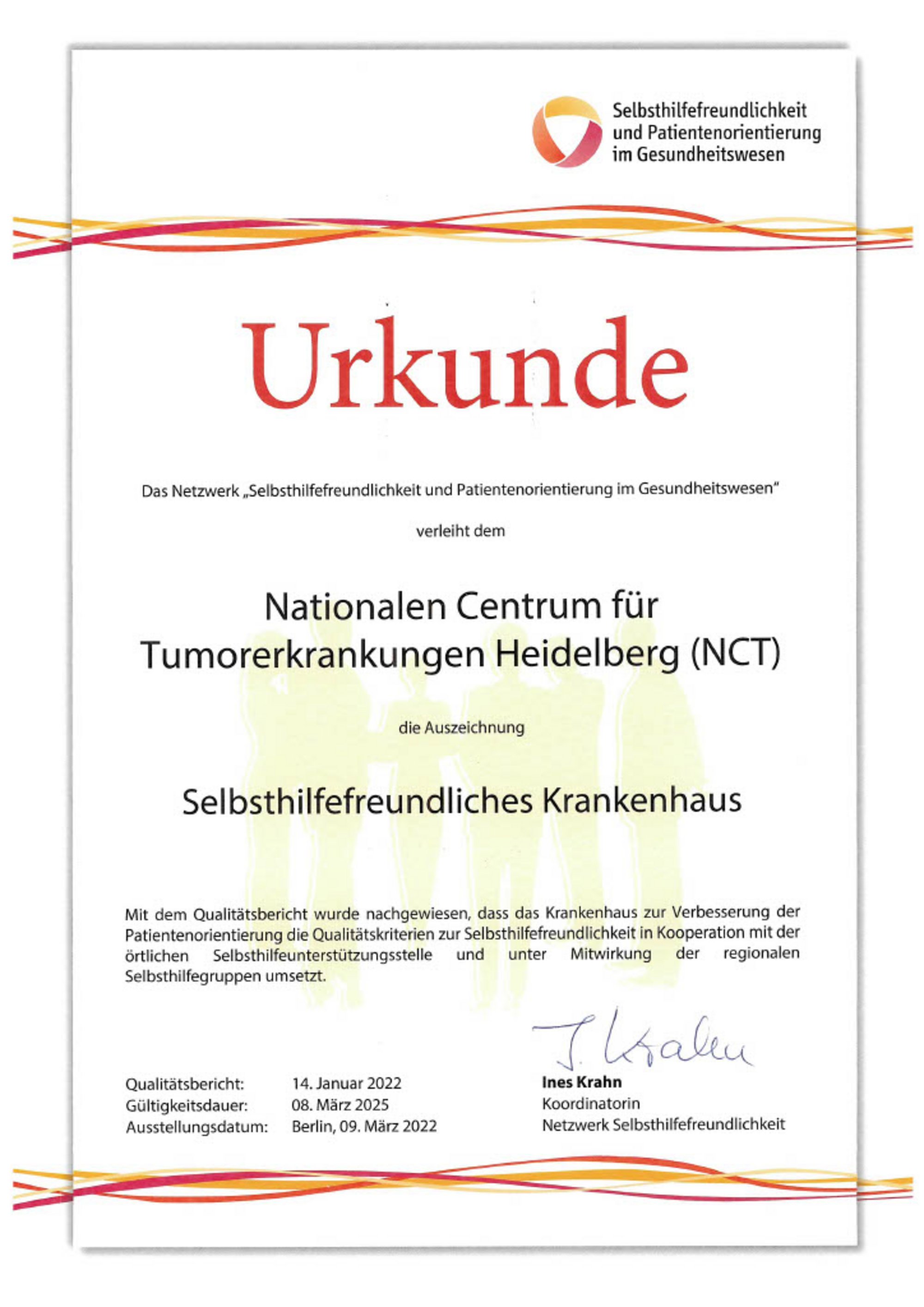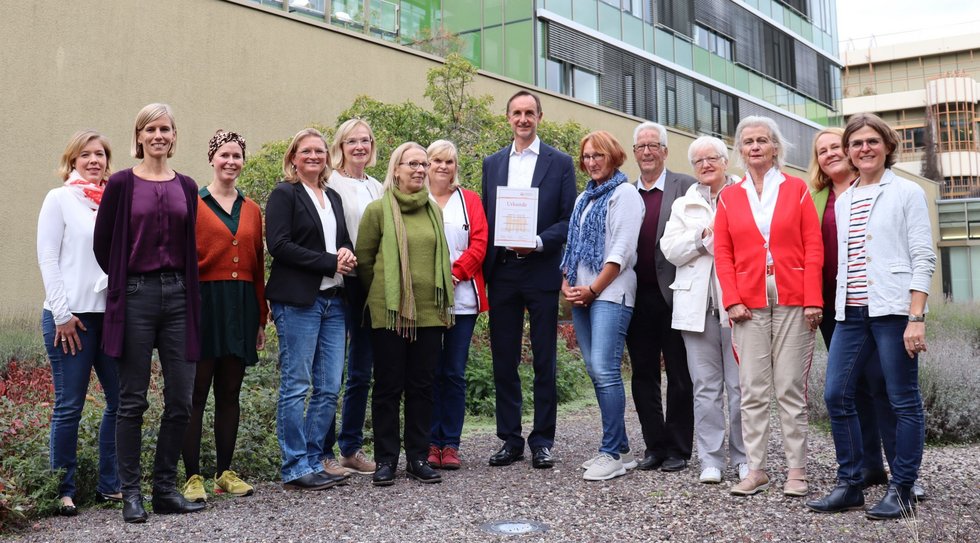On its way from being the first German Comprehensive Cancer Center to becoming a National Center of Excellence, NCT Heidelberg has continuously evolved in order to provide its patients with the best possible advice and treatment. Its recognition as an Oncology Center of Excellence by "Deutsche Krebshilfe e. V." (German Cancer Aid) is a tribute to the high-quality work performed at NCT Heidelberg.
Moreover, in 2012, NCT Heidelberg was the first oncologic center in the Rhine-Neckar Metropolitan Region to be acclaimed as a self-help friendly hospital. In 2022 – for the fifth time – NCT Heidelberg was awarded the "self-help friendly hospital" certificate.
We do not regard these commendations as the endpoint of our efforts targeting the wellbeing of our patients, but rather as the starting point for the continuous improvement of our work.
A self-help friendly hospital is characterized by
- promoting contact between patients, their families and friends, and self-help groups,
- actively supporting self-help groups willing to cooperate,
- improving medical action and care measures through integrating practical knowledge from self-help groups,
- patient orientation in the sense of self-help friendliness—systematic and refined on the basis of verifiable quality criteria.
Quality Circle
A quality circle was founded at NCT Heidelberg in which the following participants collaborate as equal partners:
- Heidelberg University Hospital
- cooperating self-help groups
- the Heidelberg Self-help Office
The network "Selbsthilfefreundlichkeit und Patientenorientierung im Gesundheitswesen" (Self-help Friendliness in the Healthcare System) supported this process through continuous methodologic and structural assistance, and also functioned as a moderator. The self-help group representatives, in consultation with the self-help delegate and under the moderation of the "Agentur Selbsthilfefreundlichkeit" (Agency for Self-help Friendliness), developed concrete measures with regard to each criterion in the quality circle, which were implemented promptly and transparently at NCT. These measures are incorporated in internal quality management.
The following oncologic self-help groups take part in the quality circle:
- Selbsthilfebeauftragte des Nationalen Centrums für Tumorerkrankungen (NCT) Heidelberg (Self-Help Representative of the National Center for Tumor Diseases (NCT) Heidelberg)
- Heidelberger Selbsthilfebüro (Heidelberg Self-Help Office)
- Selbsthilfe Lebertransplantierter Deutschland e.V. Kontaktgruppe Heidelberg (Self-help group for liver transplant patients Germany e.V. Contact group Heidelberg)
- BRCA –Netzwerk, Hilfe bei familiären Krebserkrankungen, Gesprächskreis Heidelberg / RNK (BRCA network, help with familial cancer, conversation group Heidelberg / RNK)
- ILCO Gruppe Mannheim (Schwerpunkt Stoma und Darmkrebs) (ILCO Group Mannheim (focus on stoma and colon cancer))
- Kopf Hals Tumor (KHT) Selbsthilfegruppe (Head and neck tumor (KHT) self-help group)
- Deutsche Stiftung für junge Erwachsene mit Krebs - Treffpunkt Heidelberg (German foundation for young adults with cancer - Heidelberg)
- Leukämie- und Lymphomhilfe, Metropolregion Rhein-Neckar (Leukemia and Lymphoma Support Group, Rhine-Neckar Metropolitan Region)
- Selbsthilfegruppe in der Metropolregion Rhein-Neckar für Lungenkrebskranke und Angehörige (Self-help group in the Rhine-Neckar Metropolitan Region for lung cancer patients and relatives)
- Mamazone - Frauen und Forschung gegen Brustkrebs e.V. Regionalgruppe Heidelberg - Mannheim (Mamazone - Women and Research against Breast Cancer e.V. Regional Group Heidelberg - Mannheim)
- Selbsthilfegruppe Multiples Myelom Kurpfalz (Self-help group Multiple Myeloma Kurpfalz)
- Selbsthilfegruppe Prostatakrebs Rhein-Neckar e.V. (Self-help group prostate cancer Rhein-Neckar e.V.)
- Selbsthilfegruppe NeT Neuroendokrine Tumoren (Self-help group NeT Neuroendocrine Tumors)
- LFSA – Li-Fraumeni-Syndrom Association Deutschland / Heidelberg (LFSA - Li-Fraumeni Syndrome Association Deutschland / Heidelberg )
- CUP-Forum
- Patientenvertreterinnen aus dem Patientenbeirat NCT Heidelberg (Patient representatives from the Patient Advisory Board NCT Heidelberg)
Quality Criteria
1. self-promotion is made possible
The healthcare facility provides information about the importance of self-help and joint cooperation at its central locations, rooms, and media. It provides appropriate presentation areas and rooms for use by self-help, the design of which is oriented to the needs of the patients or their relatives as well as the self-help groups.
2. the possibility of participation is pointed out
Patients and their relatives are regularly and personally informed about the possibility of participating in self-help groups that are suitable for them. They receive information material and, if necessary, are made aware of visiting services or office hours in the health care facility.
3. public relations work is supported
The healthcare facility reports on its cooperation with self-help in its media and publications. Self-help groups are supported in public and appear as cooperation partners to the professional public.
4. a contact person is appointed
The healthcare facility appoints a contact person for self-help and makes this person known to patients and employees.
5. the following are qualified on the subject of self-help
The healthcare facility employees are professionally informed about the topic of self-help in general and about the most common diseases occurring in the facility. Self-help groups or self-help support centers are included in the continuing education and training on self-help.
6. participation in self-help is enabled
The facility enables representatives of self-help to participate in appropriate committees of the health facility.
7. cooperation is reliable
The health care facility and the self-help group make concrete cooperation and regular exchange agreements. The cooperation with a self-help group and/or self-help support center is formally agreed upon and documented.
(Source: Self-help Friendliness in the Healthcare System network)
Implementation of these criteria is regularly jointly reviewed in the quality circle and any alterations in the appropriate SOPs are documented. A review focused on awarding the certificate anew is conducted every three years by the Self-help Friendliness network.









